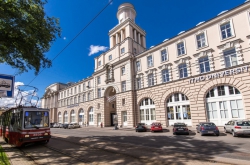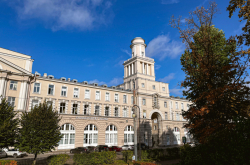Some 30 people attended the meeting; all of them expressed their deep concern with the situation.
“The issue with blocking, namely with the attempts to block a popular messenger app, has gone too far and transformed from a simple showdown between Durov (Pavel Durov – the founder of Telegram and the social network VK – Ed.) and Roskomnadzor into a battle, which has affected the Russian segment of internet. The damage from this war has cost millions to businesses. And that’s not millions of rubles I’m talking about here,” – blogged entrepreneur Samson Sholademi, who was also present at the meeting.
Anatoly Shalyto, who was awarded the presidential award “For Mentorship” in March of this year, was the second to make an address to the presidential adviser and other guests. In his speech, he emphasized the impact that the blocking of Google and Amazon’s IP-addresses will have on education and the generation of young specialists who currently face a dilemma – to stay and build their careers in Russia or make a different choice.

“What Roskomnadzor is doing, blazing through everything in its path to do that which opens the possibility for violation of article 23 of the Russian Constitution (article 23 describes the right of all citizens to personal privacy, privacy of communication and protection of personal reputation – Ed.), cannot be said to inspire youth to make achievements in science and technology,” – said Anatoly Shalyto – “What is more, a new kind of migration is emerging among them – a virtual one. Many of them use VPNs to migrate to other countries while remaining here physically. Of course, we don’t like that. What do we do? Block more? But the kids are smart and they’ll just come up with something else. And one day they’ll finally get tired of it and migrate in real life. Be gentler with our young talents, or otherwise, our future will be different from what our President expects to see one day.”
Prof. Shalyto also suggested lifting blocks off the IP-addresses used in services vital to the field of education before the consequences are too severe, as well as to consult with industry experts before attempting anything similar next time. He proposed the assistance of experts from ITMO University, a university that is among the world’s top 100 IT universities according to Times Higher Education and is also the world’s only seven-time ACM ICPC champion.
“Roskomnadzor and I have different goals: they have to follow the law, and I have to do my best to encourage talented IT specialists to stay in the university and the country. It might seem that these goals should align, but that’s quite difficult in this case, because I, as an ombudsman of IT-talents, find it hard to answer the questions that an actual ombudsman, the Internet Ombudsman Dmitry Marinichev, can’t answer. He believes that the fight against Telegram will go on forever because Telegram isn’t a website, but an application and regulatory services must block those who produce illegal content, and not the service used to distribute it,” – concluded Anatoly Shalyto.
After the meeting with the Presidential Adviser on Internet Development, Vadim Subbotin, deputy head of Roskomnadzor, proposed the use of “whitelists” of IP-addresses to enable users to access Google and Amazon’s cloud services as a temporary solution. The company Edinaya Set will handle the implementation of this proposal. However, as the country’s vice director has admitted, this will not be an absolute solution to the issue. He was also critical of another proposal voiced at the meeting – to use corporate VPNs to provide access to educational resources online.

“In this case, we’ll end up with 146 million VPNs for each Russian citizen in order to give everyone access to what they need,” – said Igor Myzgin.
On April 16, 2018, the federal agency Roskomnadzor initiated the blocking of the messenger app Telegram in Russia. Together with the app’s servers, the Federal Service for Supervision of Communications, Information Technology and Mass Media expanded the list of restricted websites with more than 18 million IP-addresses belonging to Google, Amazon, Microsoft and Digital Ocean. The blocking of one particular service affected the operation of and access to a number of unrelated websites.





